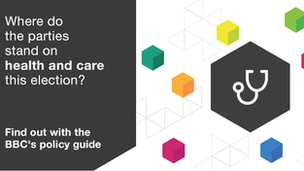Miliband warns of 'stealth privatisation' of NHS
- Published
Ed Miliband: "We need to rescue the NHS from this government"
A Conservative government would oversee the "stealth privatisation" of the NHS, Labour leader Ed Miliband has warned.
On the campaign trail in Stevenage, Mr Miliband claimed NHS patients would be pushed to the back of longer and longer queues in a "two-tier NHS".
Labour says leading English hospitals saw income from private patients rise by more than half since 2010.
But the Conservatives said private patient income was falling as a proportion of hospital budgets.
And the Lib Dems accused Labour of hypocrisy on the issue - arguing that the previous Labour government had been "totally beholden to the private sector".
In other election news:
Liberal Democrat leader Nick Clegg has said he would not join any government dependent on "life support" from the SNP
UKIP leader Nigel Farage said he was receiving hospital treatment for back pain but was fit to see out the rest of the campaign
Prime Minister David Cameron said the first black or Asian PM would be a Conservative, external as he set out a number of equal opportunity pledges
The Lib Dems have pledged £10m for mental health services for military personnel and veterans
Both of the coalition parties argue private health provision within the NHS accelerated under Labour and only went up from 4% of total NHS spending in England to 6% while they have been in power.
But, on the campaign trail in Stevenage, Herts, Mr Miliband said: "A Tory second term means stealth privatisation of the National Health Service - NHS patients finding themselves pushed to the back of longer and longer queues, operations delayed and an NHS not there when people need it.
"Under the Tories, it would be a two-tier NHS where you have to pay to get seen."
Documents from NHS trusts and financial regulator Monitor show the average income from private patients per NHS foundation trust went up by 58% from £1.7m in 2009/10 to £2.7m in 2013/14. Over that time, Labour argues, cancelled operations and A&E waits had increased for NHS patients.
The figures were derived from House of Commons written answers listing total private patient income, divided by the number of foundation trusts.
Shadow health secretary Andy Burnham said the prime minister and health secretary had not been "honest" about the "scale and pace of privatisation on their watch".
The coalition government's Health and Social Care Act, which took effect in England in 2013, allowed foundation trusts - which look after their own finances - to earn up to 49% of their total income from private services.
Before that, there was a capping mechanism which restricted how much private work these trusts could carry out.
Labour proposes a cap of 2% on work for private patients as a proportion of total income, unless they meet strict safeguards to ensure NHS patients are put first.

A senior source in the hospital trust sector told the BBC that most private work was concentrated in major teaching hospitals and specialist centres, including income from wealthy foreign patients.
This revenue helped these trusts balance their books and so secure the treatment of their NHS patients.
The source pointed out that Labour's figures showed average private patient income, although up more than half, still only amounted to £2.7m - or about 1% or less of an average trust's total income.
Labour also highlighted again the issue of NHS contracts awarded to private providers. It said its own analysis, based on Freedom of Information requests, showed that 40% of such contracts went to private companies, though the party admitted it did not have full data on the value of those deals.
A Conservative spokesman said: "This is a gimmick from Labour - official figures show that outsourcing accounts for just 6p in each NHS pound, and private patient income is actually falling as a proportion of hospital budgets."
He said Labour were "fixating" on the issue of "privatisation", claiming experts said this was a "myth".
The real debate should be "good care against poor", he added.
And the Lib Dems accused the previous Labour government of paying private providers 11% more than NHS providers for the same treatment - while introducing PFI deals which are still costing £1bn a year in repayments.
Lib Dem campaign spokesman Lord Paddick said: "The Liberal Democrats put an end to these sweetheart deals, blocked PFI contracts, prevented privatisation of the NHS through the back door and increased NHS funding each year. Now we are the only party with a detailed plan to fund the extra £8bn the NHS says it needs."